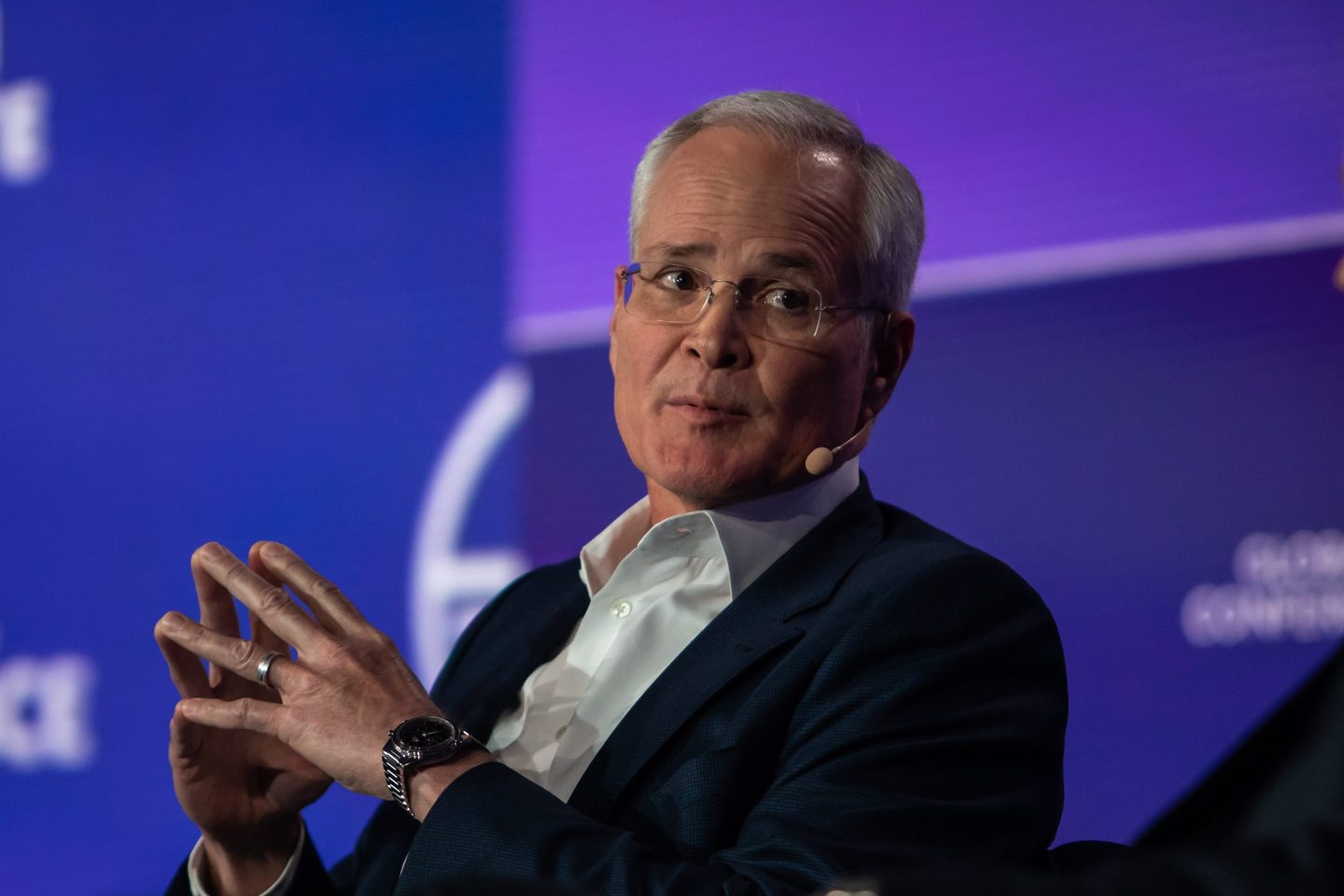U.K. Prime Minister Theresa May is set to meet with Donald Trump this week as the United States’ new president settles into the Oval Office. What’s on their agenda? Trade, terrorism, and the conflict in Syria. What’s not explicitly on the agenda? Trump’s sexist rhetoric.
In an interview with the BBC yesterday, May was asked whether she would “raise the issue of [Trump’s] treatment of women.” The question came after hundreds of thousands of people worldwide—you can see the photos here—marched in support of women’s rights on Saturday in protests sparked by Trump’s election. In London alone, an estimated 80,000 demonstrators took to the streets. May gave a murky response:
“I have already said that some of the comments that Donald Trump has made in relation to women are unacceptable. Some of those he himself has apologized for. When I sit down, I think the biggest statement that will be made about the role of women is the fact that I will be there as a female prime minister, prime minister of the U.K., directly talking to him about the interests that we share… Whenever there is something I find unacceptable, I won’t be afraid to say that to Donald Trump.”
It is certainly not up to female leaders alone to confront Trump’s treatment of women, but in sidestepping the issue, May underscores the quandary Saturday’s marchers now face: how to turn exuberant protests into political progress.
EUROPE/MIDDLE EAST/AFRICA
| . |
| Notes of royalty |
| Queen Elizabeth has a taste for the bubbly stuff. A vineyard on her Windsor Great Park estate produces English Quality Sparkling Wine. Three thousand bottles of the fizz were sold online a few months ago for £75 a piece and soon sold out. A second batch, priced at £35 a bottle, should be released later this year, with production expected to soar to 20,000 bottles annually within six or seven years. |
| Telegraph |
THE AMERICAS
| There in spirit? |
| Hillary Clinton's name was notably absent from the list of feminist icons the Women's March honored on Saturday. But the former Democratic presidential nominee, who attended Trump's inauguration on Friday, sent a message to the women who walked: “Thanks for standing, speaking & marching for our values @womensmarch. Important as ever. I truly believe we’re always Stronger Together,” she tweeted. |
| Motto |
| . |
| Change of tune |
| Former HP CEO and Republican presidential candidate Carly Fiorina faced criticism last month when she met with Trump about an administration role after previously blasting his treatment of women. She told NPR that Trump deserves a chance and said he's shown support for women by nominating a few to his cabinet. She also criticized the Women's March for what she characterized as a ban on pro-life supporters. |
| NPR |
| . |
| Facts or falsehoods? |
| Trump counselor Kellyanne Conway came under fire yesterday for defending Press Secretary Sean Spicer, who on Saturday made easily disproved claims about the size of Trump's inauguration crowd. She told NBC's Meet the Press that Spicer gave "alternative facts," which prompted host Chuck Todd to say: "Alternative facts are not facts; they're falsehoods." |
| Washington Post |
ASIA-PACIFIC
| Cultural concerns |
| The scandal surrounding South Korean President Park Geun-hye has felled another victim: cultural minister Cho Yoon-sun. Cho resigned Saturday after her arrest on allegations that she blacklisted artists who were critical of the government. The claims surfaced as authorities broadened their investigations of Park's actions. |
| Wall Street Journal |
| . |
| Poor play |
| The club set to host the Tokyo Olympic Games' golf tournament currently does not allow women. The city's first-ever female governor, Yuiko Koike, is pressuring it to change its rules ahead of 2020. “I feel very uncomfortable that women cannot become full members in this day and age,” she said. “It should be a venue open to everyone.” |
| Guardian |
| . |
| Wrestling stereotypes |
| A Disney movie called Dangal has reportedly become the highest-ever grossing film in Hindi-language cinema, with more than $70 million in ticket sales. It's based on the real-life story of two sisters born in the highly traditional northern Indian state of Haryana, where it was once customary to abort female fetuses. Under the coaching of their father, the sisters—Geeta and Babita—grew up to become world-class wrestlers. |
| NPR |
IN BRIEF
| Can the Women’s March heal the post-election rift between white and minority women? |
| Fortune |
| Meet this Nigerian seamstress-turned-entrepreneur |
| BBC |
| This playable character leads the way for women in video games |
| Independent |
| Why Martha Stewart pilots her own drone |
| Wall Street Journal |
| Melania Trump’s ‘America First’ inaugural wardrobe |
| New York Times |
| Museums across the world are collecting Women’s March signs |
| New York Magazine |
PARTING WORDS
|
|---|
| --California Representative Maxine Waters, a Democrat, on why she boycotted Trump's inauguration. |












